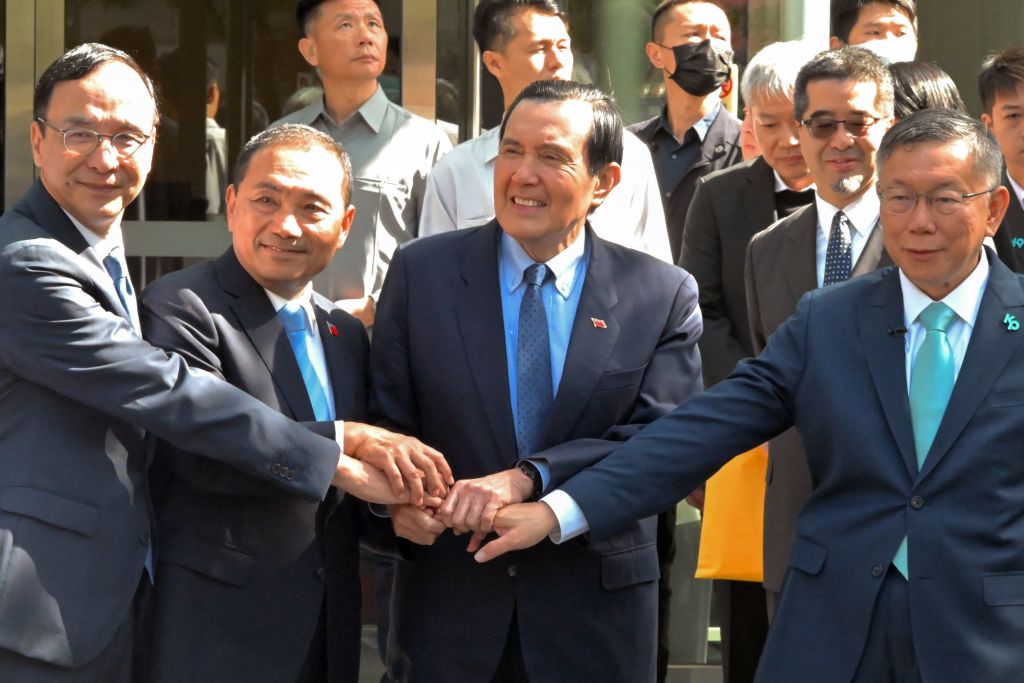
Taiwan’s opposition parties have agreed to run a joint campaign in January’s election, raising the chances that a more China-friendly government takes power in Taipei.
The Kuomintang and Taiwan People’s Party announced plans to run a united campaign following a meeting Wednesday that centered around how to decide which of their two nominees would head the campaign as the presidential candidate.
As President Joe Biden and Chinese leader Xi Jinping prepare to meet in San Francisco in an effort to repair their bilateral relationship, the developments in Taiwan could reshape global geopolitics for years to come. With Taiwan at the forefront of increasingly fraught ties between Beijing and Washington, the election of a more China-friendly government in Taipei could remove a potential flashpoint between the world’s two economic superpowers.
Read More: Both Wary of War, Taiwan’s Voters Eye China and China Eyes Taiwan’s Voters
Vice President Lai Ching-te of the ruling Democratic Progressive Party has consistently led opinion polls for much of the past year but a single opposition bid raises the likelihood of a government in Taipei more willing to accept China’s conditions for direct talks between the two sides of the Taiwan Strait.
“A successful opposition alliance — no matter who is running as president — means it’s likely cross-strait tensions will improve as the opposition has more than a 50% chance of beating the DPP’s Lai according to local polls,” according to Wang Yeh-lih, a political science professor at National Taiwan University.
“For China, either Ko or Hou taking the presidential seat will be better than Lai,” Wang added.
Lai’s campaign criticized the agreement between the KMT and the TPP, saying in a statement that it was made with no regard for either party’s vision for Taiwan.
Beijing sees the democratically ruled island as its territory and hasn’t ruled out using force to bring it under control. China has cut off direct communication with Taipei since President Tsai Ing-wen came into power in 2016 due to her refusal to accept Beijing’s position that Taiwan is part of Chinese territory.
Washington’s policymakers have pledged to help Taiwan defend itself from any potential attack and stepped up efforts to bolster the island’s defenses.
In Wednesday’s talks, KMT candidate Hou Yu-ih, the TPP’s Ko Wen-je, KMT Chairman Eric Chu and former President Ma Ying-jeou agreed to collate the results of public and internal party polls conducted between Nov. 7 and Friday to determine which candidate has the best chance of winning, according to a joint statement.
Hou, Ko and Ma will each nominate a polling expert to jointly calculate the survey results.
If the gap between the candidates’ polling results falls within the margin of error, Hou will be the winner. A result will be announced on Saturday. The two parties also agreed to form a joint government if they win the election.
Both Hou and Ko said that while they had agreed in principle to a unified campaign, a final agreement would still require more negotiations.
“This is a historic moment for Taiwan, where two parties talk to form a coalition government,” Ko said afterward. “We need everyone to work to together to work toward a final result.”
While Lai has consistently led opinion polls, a combined opposition campaign less than two months before polling day would pose a legitimate threat to his chances.
The KMT-TPP talks were the culmination of months of on-and-off negotiations between the opposition hopefuls, who had previously stumbled over which one of the parties’ candidates should take top billing. Candidates have until Nov. 24 to formally register for the January election.
Lai has benefited so far from a divided opposition to lead most opinion polls. He had a 33% support rating, according to the latest survey by broadcaster TVBS, with Ko in second at 24% and Hou with 22%. Foxconn Technology Group founder Terry Gou had the backing of 8% of respondents.
An alliance between the KMT and the TPP could leave Gou out in the cold after the independent presidential contender also floated the idea of teaming up with Ko.
A spokesperson for Gou’s campaign said Monday he will wait to have discussions with Ko’s camp before deciding what to do next, the Taipei-based Liberty Times reported.
More Must-Reads From TIME
- The 100 Most Influential People of 2024
- How Far Trump Would Go
- Scenes From Pro-Palestinian Encampments Across U.S. Universities
- Saving Seconds Is Better Than Hours
- Why Your Breakfast Should Start with a Vegetable
- 6 Compliments That Land Every Time
- Welcome to the Golden Age of Ryan Gosling
- Want Weekly Recs on What to Watch, Read, and More? Sign Up for Worth Your Time
Contact us at letters@time.com